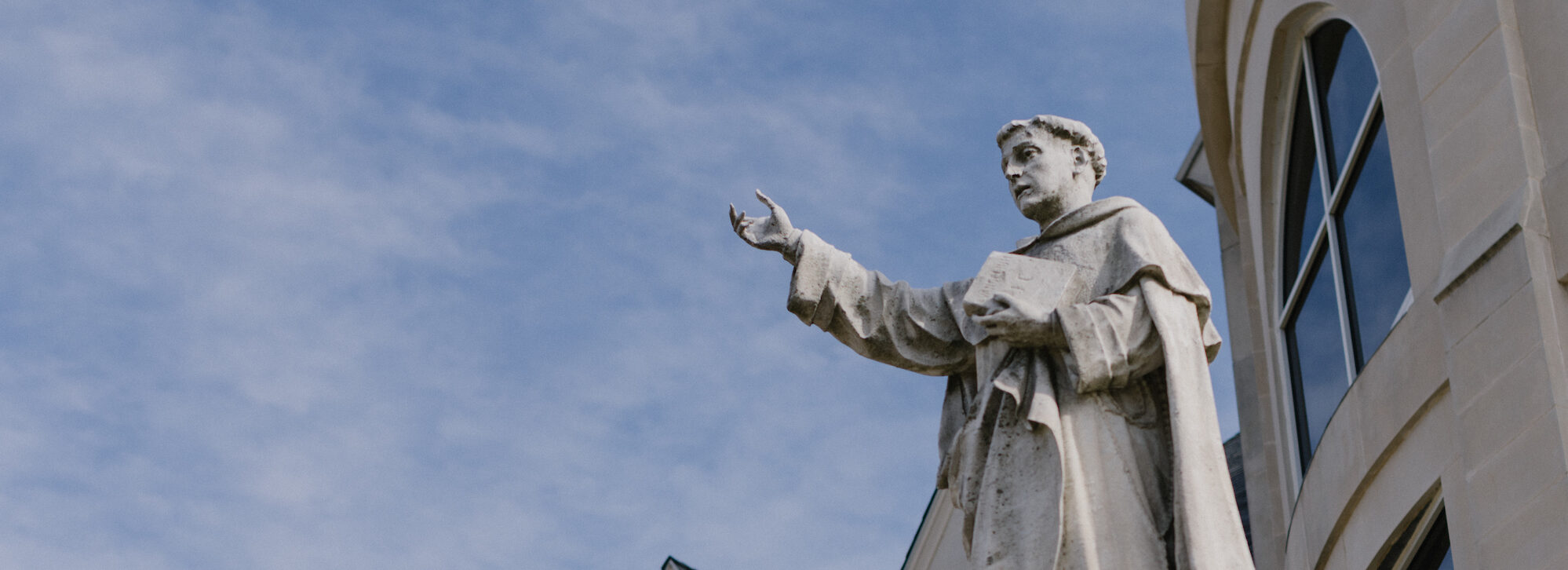The leading Master of Arts in Thomistic Studies in Washington D.C.
Classical Thomistic thinking is presented in the areas of both systematic and moral theology. Modern topics are also considered with a view to seeing the relevance of Thomistic studies for contemporary theological discourse.
Program Facts
18
Enrolled Students
5
Summers Sessions
$26,641
Average Total Cost*
Learning Objectives
This 36-credit degree program is designed to be taken over four consecutive summers with the possibility of a fifth summer for thesis development and defense. The degree is intended to prepare students for advanced degrees in the area of Thomistic thought and theology.
Upon the successful completion of this degree students should be able to:
- Demonstrate a general and integrated foundational knowledge of Thomistic speculative and moral theology, grounded in Scripture and philosophy.
- Give evidence of a basic familiarity with the primary texts of St. Thomas Aquinas.
- Employ the knowledge and skills necessary to enter doctoral studies, especially in Thomistic theology.
- Undertake Church-related work for which an M.A. is required or desirable, especially from a Thomistic point of view.
- Pursue an ongoing personal integration of theological study and the living of the faith (morally, liturgically, and spiritually).
Getting Started
Admission
The following prerequisites for admission will be evaluated by the Committee on Admissions which may, in individual cases, allow the student to remedy particular deficiencies during the first year of the program
Admissions Requirements
A bachelor’s degree from an accredited college or university.
Superior achievement and the ability to pursue graduate work as indicated by the transcript of previous studies (with a minimum GPA of 3.00).
Three letters of recommendation by persons who are in a position to judge the applicant’s ability in this academic area, along with a current photo and a completed application form.
Results of the Graduate Record Examination (GRE) indicating aptitude for graduate studies in theology if one has no previous graduate work. The PFIC is listed under Dominican House of Studies, code 2498.
An undergraduate foundation in philosophy, consisting of a minimum of 18 credit hours drawn from the following areas: history of philosophy, logic, metaphysics, ethics, philosophical anthropology, natural philosophy, and philosophy of knowledge.
A minimum of one Old Testament course and one New Testament course.
A reading knowledge of Latin and a modern language.
Course Work
A minimum of 36 credit-hours of graduate coursework is required according to the following distribution:
Systematic Theology (20 credits)
- Triune God (4)
- Creation and the Human Person (4)
- Theology of Grace (4)
- Basic Elements of Christology (4)
- Eucharist & Ecclesiology (4)
Moral Theology (12 credits)
- Principles of Christian Moral Life I, II (8)
- Theological & Cardinal Virtues (4)
Thesis Direction (4 credits)
Language Requirements
Reading proficiency in Latin and a modern language (e.g. French, German or Spanish) may be demonstrated either by successfully completing two semesters of graduate coursework in the language or by passing a written proficiency examination, offered prior to the beginning of the summer session. Since both languages are considered prerequisites, these requirements must be satisfied within the first year of study.
Helpful Resources
Ready to begin your journey?
Have a question? We're here to help. Our helpful resources are designed to guide you through all aspects of applying and studying at the Dominican house of studies.
Comprehensive Exam
To qualify for the comprehensive examination, the student must have satisfied the language requirements and have a grade point average of 3.00 or above. The student usually takes the comprehensive examination during the fourth semester of study although the Academic Dean may allow students to take the exam at other times. The exam has a single written component and its subject matter includes material covered in the required courses in systematic theology and moral theology as well as topics indicated in a special packet that the student will receive during his or her first year in the program. In order to pass the comprehensive exam, a student must receive an average grade of 3.00 on the exam. During the exam, the student will have three-hours to answer three questions from two themes (theses), two from the systematic theology area and one from the moral theology area. In each area the candidate will be able to choose from three possible questions.
The student must pass the comprehensive examination before defending his or her M.A. thesis. Students who fail the first attempt of the comprehensive exam, the thesis, or the thesis defense will be able to make a second attempt. However, they will only be able to receive the minimum required passing average grade of 3.0 on their second attempt and will be ineligible for academic honors. Candidates may not continue in the program after two failures of the comprehensive examination.
Residency
Normally the M.A. (Thomistic Studies) requires a minimum of four summer sessions or their equivalent. A fifth summer may be added for thesis writing and defense. The program may be taken on a part-time basis, but must be completed in no more than six years.
Grade Point Average
The student must maintain a grade point average of 3.00 or above throughout the M.A. program.
Model Curriculum
Year 1 (Summer) | Triune God (4) | Creation and the Human Person (4) | |
Year 2 (Summer) | Principles of Christian Moral Life I (4) | Basic Elements of Christology (4) | |
Year 3 (Summer) | Principles of Christian Moral Life II (4) | Theology of Grace (4) | |
Year 4 (Summer) | Theological & Cardinal Virtues (4) | Eucharist & Ecclesiology (4) | Thesis Direction (4) |
Additional Requirements | Latin Reading Comprehension Test (1st Year of Matriculation) | Modern Language Reading Comprehension Test (1st Year of Matriculation) | Thesis and Thesis Defense (4th Year of Matriculation) | Comprehensive Examination (4th Year of Matriculation) |
*Total or average cost does not include books, materials, or living expenses. This cost also assumes that appropriate philosophy studies have been completed.


